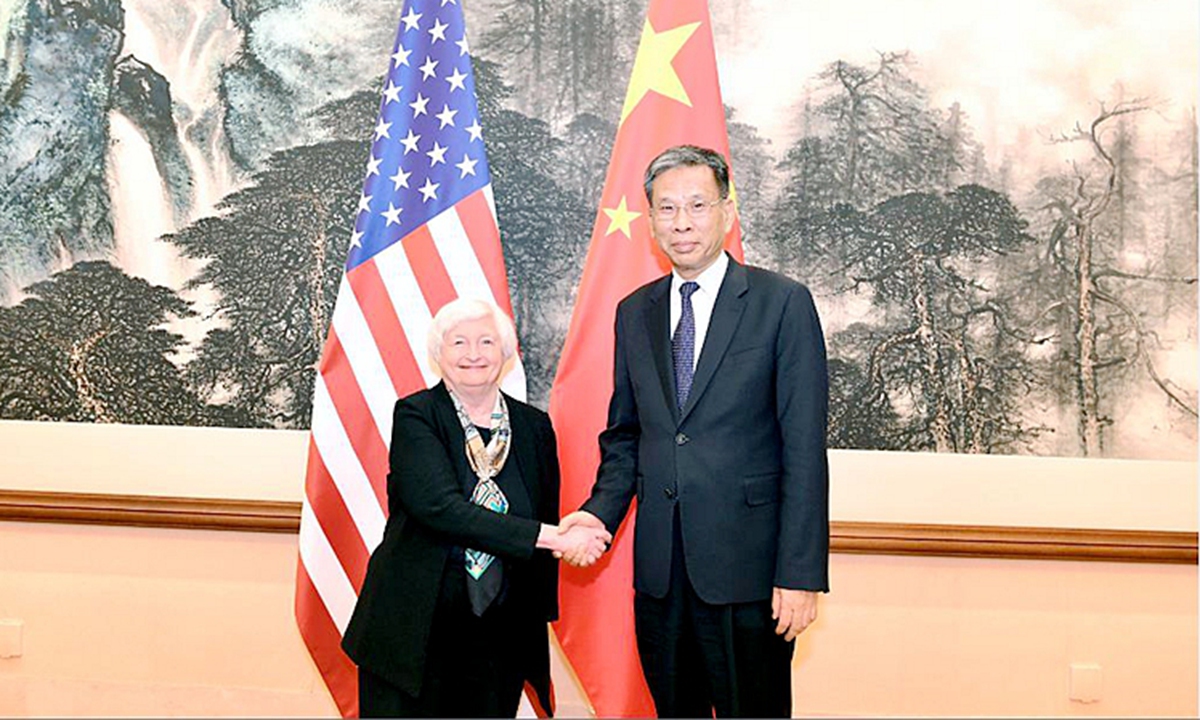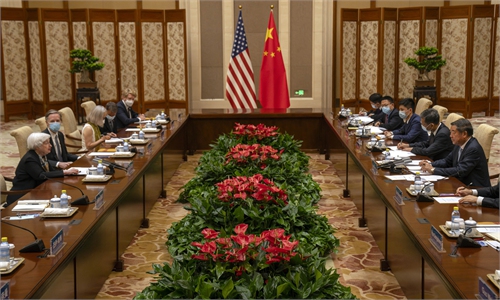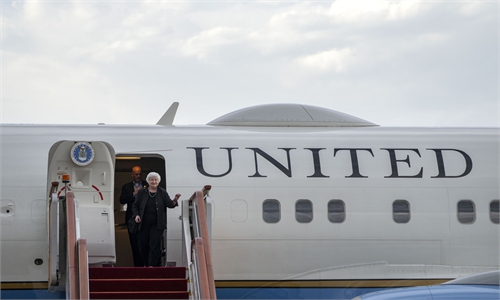
Chinese Finance Minister Liu Kun meets US Treasury Secretary Janet Yellen in Beijing on July 8, 2023. Photo: Courtesy of the Ministry of Finance
China's Ministry of Finance said on Monday that in meetings with US Treasury Secretary Janet Yellen during her recent China trip, the Chinese side raised major concerns with the US side, and urged the US to remove additional tariffs on Chinese goods, stop crackdowns on Chinese firms and treat two-way investments fairly.
Yellen's trip, which concluded on Sunday and saw what both sides described as "candid" and "constructive" meetings, was met with mixed views among Chinese observers, with many slamming Washington's lip service, while others expressing hope for more talks to at least try to stabilize economic and trade ties, which have long served as a stabilizer for overall bilateral relations.
In an online post, an official from the Ministry of Finance said that during Yellen's trip, the two sides had "candid, pragmatic, in-depth and constructive" meetings, which focused on economic and financial situations of the two countries and the world, cooperation on jointly tackling global challenges and their concerns on economic issues.
Specifically, the Chinese side urged the US side to take practical actions to respond to China's major concerns about US economic sanctions and suppression, reiterating calls for the US to remove additional tariffs on Chinese goods, stop crackdowns on Chinese firms, treat two-way investment fairly, relax restrictions on exports to China, and revoke bans on products related to Northwest China's Xinjiang Uygur Autonomous Region, according to the unnamed official.
Those actions against China "have damaged the legitimate rights and interests of Chinese market entities and undermined the public opinion foundation of bilateral relations," the official said.
"Overall, Yellen's trip constituted a chance for both sides to raise their concerns, which is a progress; however, there remain vast differences, just as the meetings showed, and much more work remain to be done," Gao Lingyun, a China-US trade expert with the Chinese Academy of Social Sciences in Beijing, told the Global Times on Monday.
As widely anticipated, the Yellen trip did not yield specific breakthroughs, but the two sides agreed to continue to maintain high-level exchanges and communications at all levels in the economic field, according to the Ministry of Finance official.
For many Chinese observers, Yellen, who is seen as a relatively more pragmatic figure in US President Joe Biden's cabinet, largely repeated Washington's talking points - the US does not seek to "decouple" from China or contain China, but will protect US national security and interests even at economic costs, which has become the catch-all pretext for all of US sanctions and crackdown measures against China.
"Expectedly, Yellen stated again that the US does not seek to 'decouple' from China, but she talked about reducing risks - which is in essence the same as 'decoupling.' So there is no sincerity at all," Bai Ming, a research fellow at the Chinese Academy of International Trade and Economic Cooperation in Beijing, told the Global Times on Monday.
Moreover, on top of their lack of sincerity in addressing major Chinese concerns, US officials have come to tell China to do this or that, which "is rather absurd," Bai said. He noted that the US can easily take some concrete moves to help ease tensions, including removing or lowering punitive tariffs on Chinese goods, which they know would be good for the US economy too.
However, such moves are unlikely in the near term, given the US' overwhelmingly hostile approach toward China, observers said. Washington is still stuck in unilateralism and hegemony, even though it talks a lot about cooperation, they contended.
Another major difference between the two countries is how they plan to stabilize bilateral ties, according to Gao. "The US focuses on specific issues. It wants to cooperate with China on addressing certain issues, while at the same time it want to continue to suppress China in other areas," Gao said. "However, China wants a comprehensive framework to tackle issues in bilateral ties, which means the US cannot seek cooperation with China when it fits its interests, and suppress China at the same time."
During her trip, Yellen made it clear the US' intention to cooperate with China on some macroeconomic and financial issues, as the US economy faces serious risks, and the global economy as a whole is also in a severe downturn.
Following her trip, the US government's climate envoy, John Kerry, is due to visit China as soon as this week according to US media reports. Climate change is another area where the US wants and needs China's cooperation. At the same time, the Biden administration is anticipated to issue an executive order to curb US investment in semiconductors and cutting-edge technologies in China, according to media reports.
So despite increased talks between China and US officials, many Chinese observers remain skeptical of the US' intentions, with some even suggesting that without concrete actions on the part of the US, the talks will not yield concrete breakthroughs.



